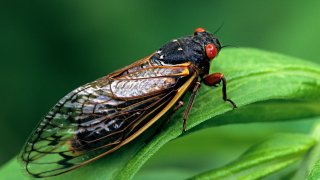
If it feels like some insects have been more plentiful this summer, you're right and we could get a break soon, an entomology expert said.
In early June, both mosquitoes and cicadas arrived in large groups to the Chicago area, but an expert said more types of bugs are expected to arrive as summer continues.
Mosquitoes have been particularly substantial this year in the area, according to Fredric Miller, senior scientist for entomology at the Morton Arboretum.
"I've been out working in some of the local forest preserves and have to wear a veil when I'm working because they're just really ferocious," Miller said. "And that's saying a lot coming from an entomologist."
Miller explained the increased mosquito population is likely due to the heavy rainfall that Chicago experienced in the spring, especially in May.
During the winter and spring seasons, mosquitoes tend to lay eggs, which will likely hatch when wet and warmer weather conditions appear.
"When you start to get up in the 80s, they go through their life stages fairly quickly and now we're seeing all these adults are out," Miller said.
Local
To prevent mosquito bites, Miller recommended people should cover up as much as possible while outside. Though temperatures are increasing, the best way to prevent bites is to wear long sleeve shirts and long pants, along with using repellent.
For those working in wooded areas that lack air flow, Miller said that wearing a hat and mosquito netting could be worth an investment with the recent prevalence of these insects.
"You get in any kinds of woods or brush and they just come after you," Miller said.
However, Chicago could see a break in these bugs soon.
With more sunshine and less rain expected in the area over the next week, Miller said a dry spell could cause mosquitoes to retreat, die or be eaten by a predator.
As those in Northern Illinois seem to have noticed, the cicada population is also unexpectedly heavy this summer, Miller explained.
Last time the Chicago area saw a cicada emergence was in 2007, making this summer 17 years to date. However, Miller said the Northern Illinois brute of cicadas was not expected to have a major emergence until 2024.
"Either they didn't get the memo that it's 2020 or something has happened biologically," Miller said.
In terms of climate, the Chicago area has had fairly mild winters over the past few years creating warmer soil for the insects. According to Miller, this could have led to a sped up formation process causing cicadas to now emerge.
The Northern Illinois brute doesn't overlap with others in the surrounding areas, which shows these cicadas are emerging from local soil. However, they are different than the annual cicada.
Each year in August, some cicadas emerge that are larger, with clear wings, a black and green body and a silver underbelly. The periodical cicadas this June are smaller with red eyes and a black body.
Miller predicted the cicadas this summer will start to die over the next few weeks, likely subsiding by July 1.
After these insects mate and lay eggs in twigs and branches of woody plants, the adults will die and their eggs drop to the ground for likely 17 years.
In the last part of June into early July, Miller said Japanese beetles could start showing up, which is an annual occurrence for Northern Illinois.
Though Miller explained no two years are the same in terms of insect activity, Chicago has seen a heavy presence in Japanese beetles over the past few years which can be expected again.
The brown marmorated stink bug and the spotted lanternfly could emerge over the next month, both of which are not native to the United States.
Miller said Illinois has yet to see the spotted lanternfly, but entomologists are keeping a close watch after the bug did sufficient tree and mold damage along the East Coast.
As summer continues, Miller suggested people do consistent "tick checks" as those popular insects can cause major health issues to people this time of year.
To avoid tick-borne diseases, the CDC recommends to:
- Check clothing for ticks, as many attach to clothes
- Use a mirror to conduct a full-body tick check
- Shower immediately after being outdoors
If an individual finds a tick burrowing into the skin, the CDC recommends using tweezers to quickly remove the tick and to monitor for a rash or fever in coming days.



